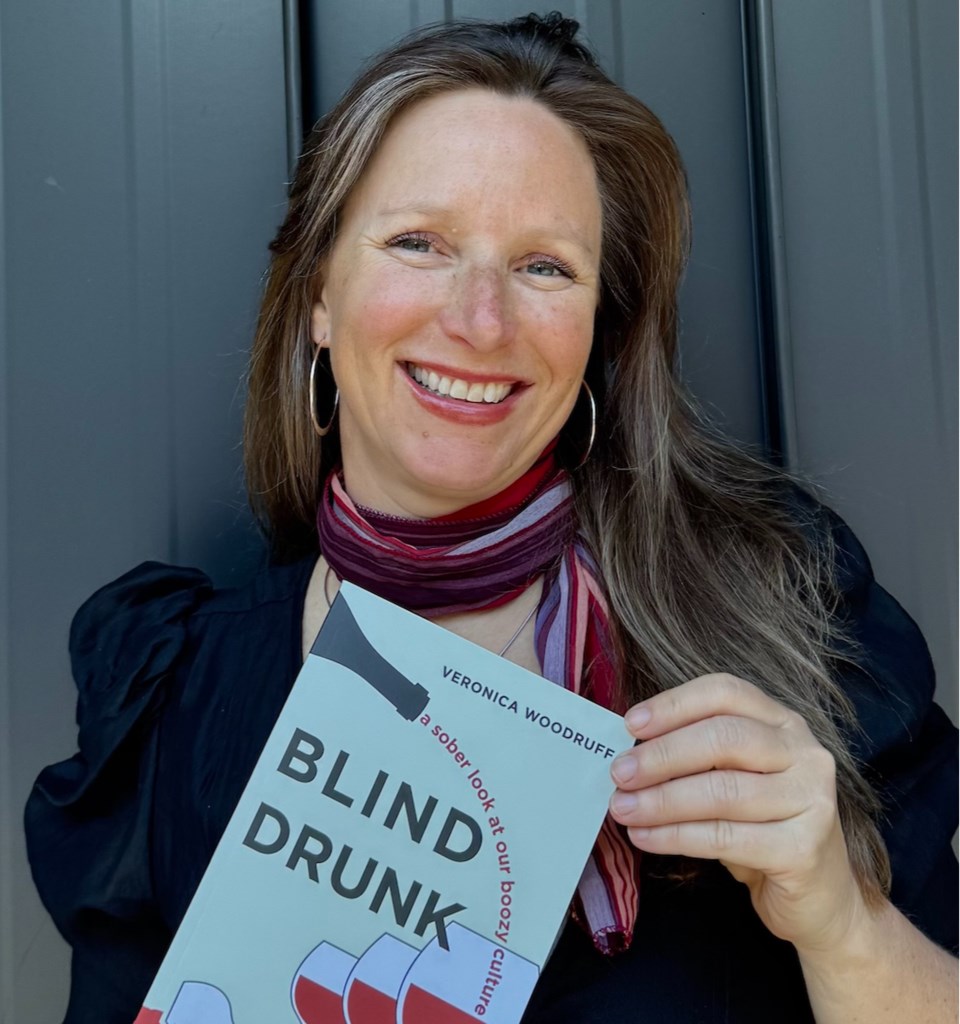In early 2023, Pique Newsmagazine ran a cover feature written by Veronica Woodruff about her lifelong battle with binge-drinking and eventual journey to sobriety. It made quite the impact, as she received hundreds of social media messages from people across Canada. Some even reported that her words inspired them to take a break from alcohol.
Woodruff has now transformed that story into her first book called Blind Drunk: A Sober Look at Our Boozy Culture.
"I always wanted to write, because I grew up in this different way where my parents were so lavishly rich and then lost everything because my dad was such a drunk," she says. "I moved out really young into the system, around 15, but the system back in the day wasn't like the system today. In the '90s, it was like, 'we'll give you some welfare and you can work at the mall and live with this old Australian couple.' I didn't think I was a good enough writer … and now, suddenly, I've been writing for 30 years."
A friend named Cindy Filipenko advised Woodruff not to self-publish unless she wanted boxes of books lying around her home. Instead, she attended a Whistler Writers Festival (WWF) publishing workshop to learn more about the industry.
There, another lady voiced that Woodruff's original pitch, much like her cover feature, was too rooted in Sea to Sky culture for interest from mainstream audiences. On the other hand, a work discussing alcohol in the greater context of North American society might have potential.
"These bells went off," recalls Woodruff. "I was like, 'that is the book right there.' It's a review of alcohol and culture, and that was the bridge where I could bring my parents' story in. It wasn't just about Whistler life. It became so much broader than that."
Trajectories of drinking
Woodruff holds a master of arts in leadership and an environmental science background, which she used to examine the role of drinking in Western culture: from the heavy-handed preaching of Prohibition to more contemporary, empirical approaches. She believes alcohol is a social lubrication ubiquitously present in many realms like parties, vacations, book clubs, après ski on a Tuesday, etc.
Even professional circles can be saturated in alcohol. Woodruff has been to many scientific conferences where she and her peers let down their hair at evening socials with a few glasses of wine—or more.
Changing and conflicting public messages about drinking can also muddy the waters. For instance, the idea that consuming moderate amounts of booze can be healthy is still peddled by lobby groups despite having been debunked by science. Until late 2019, Health Canada's website promoted a similar message.
"The key is to recognize the healthy pieces around alcohol, and acknowledge that it can be a dangerous drug," Woodruff opines. "I didn't question how much was too much, because there was always somebody more drunk than I was. Here's my theory that I can't necessarily back up: anyone who's drinking is kind of on a trajectory that they can have [X amount of alcohol per week], and they have that amount for their whole lives.
"I hear this a lot: 'my grandma drank this much and she lived to 90,' but when alcohol becomes part of your identity, where it becomes the thing you reach for in celebration but also when things are really bad, that's when you can go wrong."
For Woodruff, that tragedy came when she ran over her dog by accident. Knowing it could have been even worse—it could have been a child—she still attempted to drown her grief at the bottom of a bottle. Every night involved wine, and the trend continued for months.
Realistic risks
Despite her chronic binge-drinking, Woodruff built a successful career earning multiple awards and publishing multiple scientific studies. A certified public speaker with the International Association for Public Participation, she's worked alongside governments and consultancies while launching a number of businesses and non-profits. She also found a partner and began a family.
But something wasn't right.
"I [knew] I was drinking too much in my heart of hearts," says Woodruff. "Understanding how to do that was a barrier, because there's so many fun things to do in Whistler with your friends. [Eventually] I recognized that my brain was so powerful: the biases I had created around booze and its importance to my happiness was just a fiction."
Health Canada's new low-risk guidelines reduce the maximum suggested intake from 10 to two drinks per week, and in some cases they are being heeded. Woodruff sees that many in her age group are beginning to cut back on alcohol consumption as they find it can be detrimental in various ways. However, drinking culture obviously remains alive and well in numerous areas.
"I think the younger generation is really slowing down and being more health-conscious, but at the same time, my daughter's a teenager and there's a lot of [booze] for some of those kids in high school," Woodruff remarks. "I think the conversation is about the realistic risk, which we are still determining. I'm excited to be a part of it, and not in a proselytizing kind of way … the book isn't intended to be self-help. It's more intended to be this review of what's available, of what we know and what we have yet to learn."
Check out Blind Drunk at tidewaterpress.ca/blind-drunk. It is available at Stay Wild in Pemberton, Armchair Books in Whistler, and Gather in Squamish, with a Kindle version due out in June.




